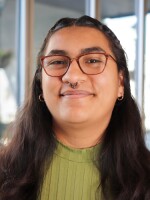WUWM has been serving the community for almost 60 years. To celebrate the work that we do, we're talking to the people who do it.
For three years digital producer and host of All Things Considered has been keeping our audience company during the afternoon. For this segment of Get to know WUWM we sat down with Rob to learn more about hims, his approaches to hosting on air and his recent recognition as the best voice in Milwaukee.
This conversation has been edited for length and clarity.
Doing on-air hosting work can be very different than digital producing. What are the mental switches you have to make to prepare for each role or each task, and how do you approach that job, especially with different mediums?
I think when I first started, just as maybe to be expected, it was pretty hard. Well, I'll say it was challenging because I started primarily as the digital producer for the Lake Effect stories. You're tasked with listening to an interview about a guest or a topic you probably know very little about, and then you have to create the digital story for this thing that's going to exist on our app, that's going to exist on the website, that's going to be our presentation of this topic to the public, to the world, really. You have to present it and write it in a way that is honoring to the interviewer, that's honoring to the Lake Effect producer, that is accurate, that's trusted, all these things.
That really did take a while to figure out. It is a skill you have to develop. And then on top of that, now I'm transitioning into being this very public entity, this very public presence for tens of thousands of people at a time. Going from having to interpret to presenting, you just have to know what's going on. You have to make sure you understand it and you have to make sure that you can present it in a way that's clear and concise.
Once I realized that, I think that actually made it easier for me to make that transition because what I started to figure out is that a lot of those concepts really do carry over, and a lot of the task is the same. So I think once that light switch flipped in the correct position for me, it allowed me to understand that the biggest difference at that point was from local to national — what's going on in Milwaukee to what's going on anywhere on All Things Considered.
How would you say WUWM as a station represents the city and its people?
Well, WUWM has really always been dedicated to serving this area. We recently eclipsed 60 years as a station, and part of that, the year prior to the time of this recording, in anticipation of that, we did a lot of celebrating and a lot of looking back at some of the things WUWM has done. I think it's kind of wild that our station predates NPR and all these different things.
Whether it's been through music or now primarily through news and information, the station has always been committed to serving and enriching Milwaukee in whatever way it saw fit to do that. Milwaukee is a complex city, and there are a lot of different nuances that make the city what it is. There's always been a political footprint here in some way. You're talking about the biggest city in what has, particularly for the last few decades, been a pretty prominent swing state politically. There was also a point in time where this was a very big manufacturing hub. Beer is a big part of the city, we named our baseball team after it.
I think Milwaukee is vast, with so many nuances, and telling stories that are fully reflective of those nuances is hard to do. It's easy to have blind spots. I think there's space for us as a station to grow in how we do that. There are angles we haven't thought of or pursued, but I also believe we're aware of that as a station. I believe we have the desire to always be as reflective as we can be and as diverse as we can be in our storytelling and in our presence here in the city.
In terms of what we do now, the reporting we do includes dedicated beat reporters, general assignment reporters and phenomenal storytellers, my present company included. I think we're very plugged in. I think we have remained dedicated to our roots of being diligent and trying to serve the city and the community the best we can. I think there's something to be said for that.
If you weren't reporting, you weren't an editor, you didn't have any bills, money didn't matter, what would you be doing instead of this job?
I think if I weren't in this field, it's really tempting to say music, and to some degree that's absolutely true. But something I would really like to do, and that I'm not ruling out at some point in my life, is to pursue voiceover and voice acting work.






